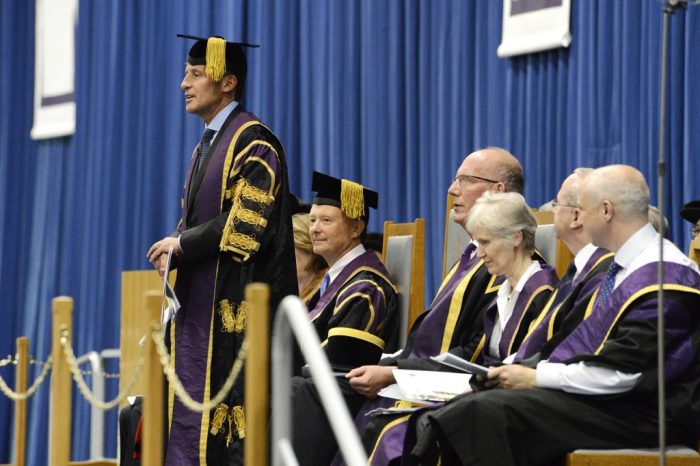The Chancellor of a university holds a position of great importance within the academic hierarchy. As the ceremonial head of the institution, the Chancellor plays a vital role in representing the university, overseeing its strategic direction, and fostering its reputation. This comprehensive guide will delve into the multifaceted responsibilities of the Chancellor, exploring their role in governance, strategic planning, and community engagement.
From their involvement in graduation ceremonies to their collaboration with university officials, the Chancellor’s influence extends across all aspects of university life. By understanding the Chancellor’s role, we gain a deeper appreciation for the intricate tapestry of higher education leadership.
Selection and Appointment Process

The process of selecting and appointing a Chancellor typically involves several key stakeholders and follows a structured procedure. The Board of Trustees, a governing body responsible for the university’s oversight and strategic direction, plays a central role in this process.
Board of Trustees’ Involvement
- Establish a search committee composed of Board members, faculty representatives, and external stakeholders.
- Develop a job description outlining the qualifications, experience, and responsibilities of the Chancellor role.
- Review and evaluate candidate applications and conduct interviews.
- Make a final selection and present it to the full Board for approval.
Faculty Involvement
Faculty members often have significant input in the selection process, ensuring that the Chancellor’s academic credentials and vision align with the university’s mission and goals.
- Provide feedback on the job description and candidate qualifications.
- Participate in candidate interviews and provide assessments.
- Offer perspectives on the university’s strategic priorities and academic needs.
Qualifications and Experience
Candidates for the Chancellor role typically possess a distinguished academic background, including a doctorate in a relevant field. They should have a proven track record of leadership in higher education, demonstrating strong management, communication, and fundraising skills.
- Experience as a senior administrator or academic leader at a university or research institution.
- Excellent communication and interpersonal skills, with the ability to build relationships with diverse stakeholders.
- Commitment to academic excellence, research, and innovation.
- Understanding of university governance, finance, and fundraising.
Relationship with Other University Officials
The Chancellor holds a unique position within the university hierarchy, fostering a collaborative and mutually respectful relationship with the President or Vice-Chancellor. While the President or Vice-Chancellor serves as the university’s chief executive officer, responsible for its day-to-day operations, the Chancellor plays a more strategic and ceremonial role.
The Chancellor provides guidance and support to the President or Vice-Chancellor, offering advice on matters related to the university’s mission, vision, and strategic direction. They also represent the university at official functions and serve as ambassadors for the institution in the wider community.
Chancellor’s Role in Overseeing Academic and Administrative Functions
While the Chancellor does not directly manage the university’s academic and administrative functions, they play a crucial role in overseeing these areas. They work closely with the President or Vice-Chancellor to ensure that the university’s academic programs and administrative policies align with its strategic goals.
The Chancellor may also chair or participate in university committees responsible for academic planning, faculty appointments, and resource allocation. Through these roles, they provide input and guidance on matters that impact the university’s academic integrity, reputation, and overall performance.
Chancellor’s Interactions with Other University Officials
The Chancellor interacts regularly with other university officials, including deans, department heads, and faculty members. These interactions foster collaboration and ensure that the university’s leadership team is working towards a common goal.
The Chancellor may attend faculty meetings, engage in discussions with deans and department heads, and participate in university-wide initiatives. Through these interactions, they gain valuable insights into the university’s strengths, challenges, and areas for improvement.
Ceremonial and Representative Functions

The Chancellor is the university’s chief ceremonial officer, representing the institution at official events, including conferences, fundraising galas, and public speaking engagements.
The Chancellor plays a central role in graduation ceremonies, conferring degrees upon graduates and delivering speeches that inspire and motivate the graduating class.
Promoting the University’s Reputation
The Chancellor is an ambassador for the university, actively promoting its reputation and fostering community engagement.
- Attends industry events and conferences to connect with potential donors and partners.
- Meets with alumni and community leaders to build relationships and secure support.
- Represents the university in the media and on social media, sharing its accomplishments and promoting its mission.
Governance and Strategic Planning

The Chancellor plays a pivotal role in shaping the university’s future by providing strategic direction and overseeing its long-term success.
As the university’s chief executive officer, the Chancellor is responsible for developing and implementing policies that guide the institution’s academic, financial, and operational activities.
Setting Strategic Direction
The Chancellor leads the university in developing and implementing a strategic plan that Artikels the institution’s vision, mission, and goals. This plan serves as a roadmap for the university’s future, guiding its decision-making and resource allocation.
Developing and Implementing Policies
The Chancellor is responsible for developing and implementing policies that govern the university’s operations. These policies cover a wide range of areas, including academic standards, student conduct, faculty tenure, and financial management.
Ensuring Financial Stability and Long-Term Success
The Chancellor oversees the university’s financial resources and ensures its long-term financial stability. This includes managing the university’s budget, investing its endowment, and fundraising to support its academic and research programs.
Query Resolution
What is the primary role of the Chancellor in a university?
The Chancellor serves as the ceremonial head of the university, representing it at official events and fostering its reputation.
How is the Chancellor typically selected?
The Chancellor is usually appointed by the Board of Trustees or a similar governing body, with input from faculty and other stakeholders.
What are the key responsibilities of the Chancellor?
The Chancellor’s responsibilities include setting the university’s strategic direction, overseeing academic and administrative functions, and ensuring its financial stability.
How does the Chancellor interact with other university officials?
The Chancellor collaborates closely with the President or Vice-Chancellor, deans, and department heads to ensure the smooth operation of the university.
What is the difference between the Chancellor and the President of a university?
While the Chancellor is the ceremonial head, the President is the chief executive officer responsible for the day-to-day operations of the university.




